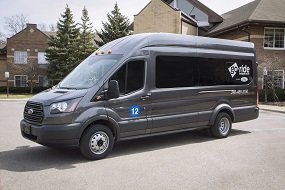Addressing Social Barriers in Health Care

DETROIT – Henry Ford Health System, in partnership with Ford Smart Mobility LLC and Gleaners Community Food Bank, is piloting a project to address social barriers facing underserved patients in the tri-county area.
Research has shown that addressing social barriers like lack of transportation, food insecurity, unemployment and housing instability can be more impactful for improving a person’s health outcome than medical care. The two-phase pilot will evaluate the effectiveness of providing transportation and food delivery for reducing readmissions of chronically ill patients to Henry Ford Hospital in Detroit.
In phase one, patients will be transported to and from their appointments through Ford’s GoRide non-emergency medical transportation service. In phase two, GoRide will provide these patients access to food from Gleaners.
At the end of the six-month pilot, Henry Ford will measure the impact of these two services on the patients’ readmission rate.
“With the health care landscape moving to a value-based model from a volume-based one, we as an industry need to focus even more on what we can do better to address the social barriers facing our patients,” says Kimberlydawn Wisdom, M.D., Henry Ford’s senior vice president of Community Health and Equity and chief wellness officer.
“Shifting the focus from sickness to well-being and being able to connect and coordinate community resources will result in better health outcomes for many patients.”
An estimated 3.6 million people miss their medical appointments due to issues related to transportation, according to a 2006 study. Missed appointments are associated with worsening symptoms and increased need for emergency care and hospitalization, and account for an estimated $150 billion in costs annually to the U.S. health care system. In 2017, 28 percent of appointments were canceled across the Henry Ford system due to a transportation issue.
In a 2017 study by the Centers of Disease Control and Prevention, food insecurity was associated with a “higher likelihood” of patients with chronic kidney disease developing end-stage renal disease, or kidney failure.
The pilot is being funded through Henry Ford’s Tom Groth Medical Needs Fund, which provides assistance to patients discharged from Henry Ford Hospital who may not have the means to pay for prescription medications, transportation, medical supplies and other health resources.
About 50-70 patients who have a chronic illness such as congestive heart failure, diabetes or vascular disease will be involved in the pilot. They reside within a 25-mile radius of Henry Ford Hospital.
“This pilot is important because it’s an opportunity to change the culture of health in the communities we serve,” says Michele Richards, director of Patient Care Management and Assistance who is leading the pilot for Henry Ford. “This is more than moving patients from point A to point B. It’s about addressing the social barriers to health.”
The partnership with Ford Motor is unique in that it’s more than a transportation service.
“This pilot with Henry Ford and Gleaners is designed to understand how a range of social factors can impact longer term health,” said Minyang Jiang, Ford GoRide business lead. “Providing access to healthcare and other social services for underserved patients is a key point of difference that we offer through GoRide. This is what we mean when we talk about a human-centered approach to mobility solutions.”
GoRide provides safe and timely transportation to and from medical appointments for people with mobility challenges, such as the elderly, those in wheelchairs or bariatric patients. With professionally trained drivers and specially-outfitted Ford Transit vans, GoRide has a 97 percent on-time pick-up and delivery average.
Ford GoRide is part of Ford Smart Mobility LLC, Ford’s business focused on designing, building, growing and investing in emerging mobility services globally.
“For many families, the biggest barrier to getting the food they need is transportation. Our work with Henry Ford Health System and Ford Smart Mobility will restore families to food security, relieve the toxic stress of hunger, and improve the well-being of vulnerable kids, families, and others with heath concerns,” says Gerald Brisson, president and CEO of Gleaners. “It’s exciting to see Gleaners’ mission fulfilled in this way – providing households with access to nutritious food and related resources through collaboration, efficient operations, education, and innovative solutions.”
Last year, Gleaners distributed more than 43 million pounds of food to hungry neighbors through hundreds of schools, pantries, shelters and other agencies in Livingston, Macomb, Monroe, Oakland, and Wayne counties.
###
MEDIA CONTACTS: David Olejarz / David.Olejarz@hfhs.org / 313.874.4094 Sinead Phipps / sphipps6@ford.com / 313. 820.7573 Stacy Kessel / skessel@gcfb.org / 866.453.2637
.svg?iar=0&hash=F6049510E33E4E6D8196C26CCC0A64A4)

/hfh-logo-main--white.svg?iar=0&hash=ED491CBFADFB7670FAE94559C98D7798)









